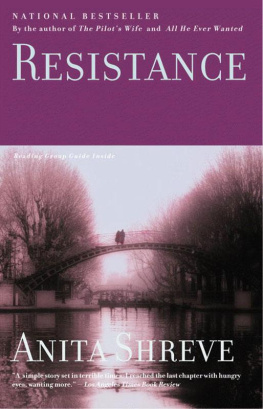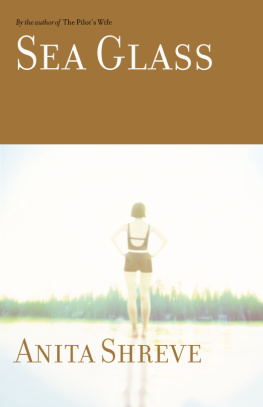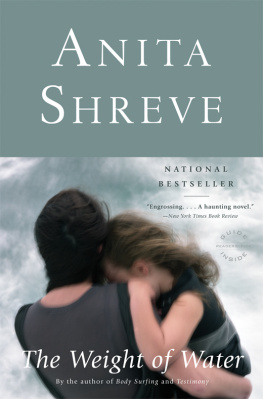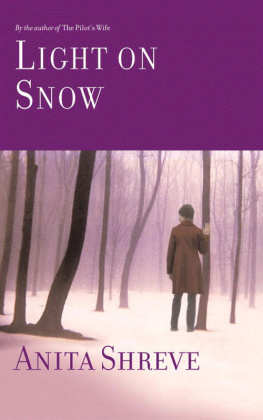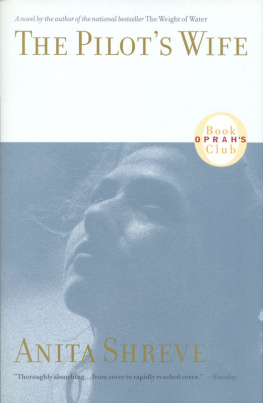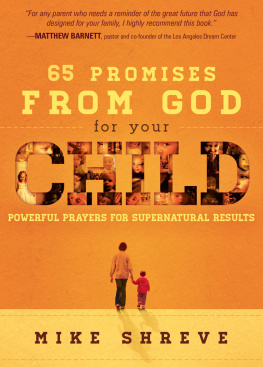Anita Shreve - All He Ever Wanted
Here you can read online Anita Shreve - All He Ever Wanted full text of the book (entire story) in english for free. Download pdf and epub, get meaning, cover and reviews about this ebook. year: 2003, publisher: Little, Brown & Company, genre: Art. Description of the work, (preface) as well as reviews are available. Best literature library LitArk.com created for fans of good reading and offers a wide selection of genres:
Romance novel
Science fiction
Adventure
Detective
Science
History
Home and family
Prose
Art
Politics
Computer
Non-fiction
Religion
Business
Children
Humor
Choose a favorite category and find really read worthwhile books. Enjoy immersion in the world of imagination, feel the emotions of the characters or learn something new for yourself, make an fascinating discovery.

- Book:All He Ever Wanted
- Author:
- Publisher:Little, Brown & Company
- Genre:
- Year:2003
- Rating:5 / 5
- Favourites:Add to favourites
- Your mark:
- 100
- 1
- 2
- 3
- 4
- 5
All He Ever Wanted : summary, description and annotation
We offer to read an annotation, description, summary or preface (depends on what the author of the book "All He Ever Wanted " wrote himself). If you haven't found the necessary information about the book — write in the comments, we will try to find it.
All He Ever Wanted — read online for free the complete book (whole text) full work
Below is the text of the book, divided by pages. System saving the place of the last page read, allows you to conveniently read the book "All He Ever Wanted " online for free, without having to search again every time where you left off. Put a bookmark, and you can go to the page where you finished reading at any time.
Font size:
Interval:
Bookmark:
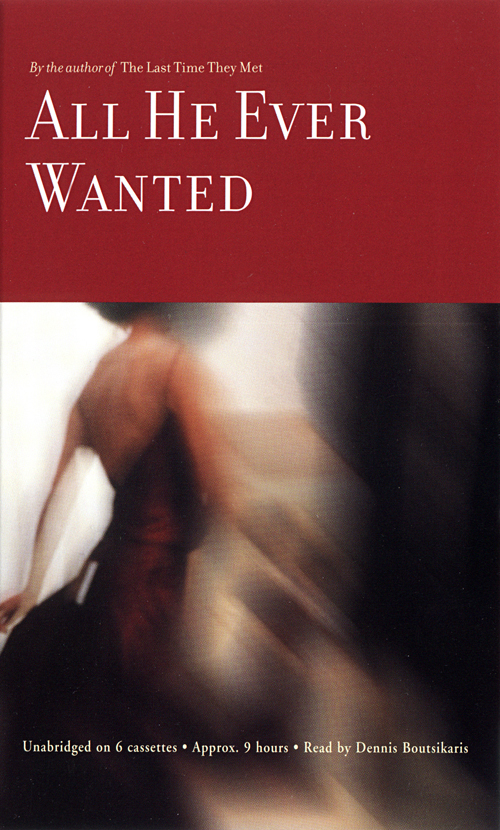
Copyright 2003 by Anita Shreve
All rights reserved. No part of this book may be reproduced in any form or by any electronic or mechanical means, including information storage and retrieval systems, without permission in writing from the publisher, except by a reviewer who may quote brief passages in a review.
Little,Brown and Company
Hachette Book Group
237 Park Avenue
New York, NY 10017
Visit our website at www.HachetteBookGroup.com.
The Little,Brown and Company name and logo are trademarks of Hachette Book Group, Inc.
First eBook Edition: April 2003
ISBN: 978-0-7595-2823-9
ALSO BY ANITA SHREVE
Sea Glass
The Last Time They Met
Fortunes Rocks
The Pilots Wife
The Weight of Water
Resistance
Where or When
Strange Fits of Passion
Eden Close
for Katherine
T he fire began in the kitchen and spread to the hotel dining room. Without warning, or perhaps just the one muffled cry of alarm, a ball of fire (yes, actually a ball) rolled through the arched and shuttered doorway from the kitchen, a sphere of moving color so remarkable, it was as though it had life and menace, when, of course, it did not when, of course, it was simply a fact of science or of nature and not of God. For a moment, I felt paralyzed, and I remember in the greatest detail the way the flame climbed the long vermilion drapes with a squirrels speed and agility and how the fire actually leapt from valance to valance, disintegrating the fabric and causing it to fall as pieces of ash onto the diners below. It was nearly impossible to witness such an event and not think a cataclysm had been visited upon the diners for their sins, past or future.
If the fact of the fire did not immediately penetrate my consciousness, the heat of the blast did and soon propelled me from my seat. All around me, there was a confusion of upended tables, overturned chairs, bodies pitched toward the door of the dining room, and the sounds of broken glass and crockery. Fortunately, the windows toward the street, large windows through which a body might pass, had been thrown open by an enterprising diner. I remember that I rolled sideways through one of these window frames and fell onto the snow and was immediately aware that I should move aside to allow others to land as I had and it was in that moment that my altruism was finally triggered. I rose to my feet and began to assist those who had sustained cuts and bruises and broken bones, or who had been mildly crushed in the chaos. The blaze lit up the escaped diners with a light greater than any other that could be produced in the night, so that I was able to see clearly the dazed expressions of those near to me. Many people were coughing, and some were crying, and all looked as though they had been struck by a blow to the head. A few men attempted heroics and tried to go back into the hotel to save those who remained behind, and I think one student did actually rescue an elderly woman who had succumbed to paralysis beside the buffet table; but generally there was no thought of reentering the burning building once one had escaped. Indeed, so great was the heat that we in the crowd had to move farther and farther across the street until we all stood in the college quadrangle, surrounded by bare oaks and elms and stately sycamores.
Later we would learn that the fire had begun with a few drops of oil spilled onto a kitchen fire, and that the undercook, who stood near to the stove, had felt compelled to extinguish the fire by throwing upon it a pitcher of water and then, in her excitement, fanning the flames with a cloth she was holding. Some twenty persons in the upper stories of the hotel were trapped in their rooms and burned to death one of these Myles Chapin from the Chemistry faculty, and what he was doing in a hotel room when his wife and child were safely at home on Wheelock Street I should not like to speculate (perhaps it was his compromised circumstances that made the man hesitate just a second when he should not have). Surprisingly, only one of the kitchen staff perished, owing to the fact that the back door had been left open, and the fire, moving with the particular drafts between door and windows, sped toward the dining room, allowing most of the staff to escape unharmed, including the hapless undercook who had started it all with her fluster.
The hotel was situated directly across from Thrupp College, where I was then engaged as the Cornish Professor of English Literature and Rhetoric. Thrupp was, and is (even now, as I set down my story), a mens school of, shall we say, modest reputation. Its buildings are a motley collection, some of them truly hideous, erected at the beginning of the last century by men who envisioned a seminary but later contented themselves with a small enclave of intellectual inquiry and classical education. There was one impressive Georgian building that housed the administration, but it was surrounded by altogether too many dark brick structures with small windows and oddly placed turrets that were emblematic of perhaps the most dismal period of American architecture, which is to say early Victorian Gothic. Some of these edifices surrounded the quadrangle; the rest spilled along the streets of a town that was all but dominated by the college. Because the school had elected to retain the flavor of a small New England village, however, the colonial clapboard houses that lined Wheelock Street had been left intact and served as residences for the more eminent figures in the various faculties. At the outskirts of town, before the granite hills began, lay the farms: struggling enterprises that had been witness to generations of men trying to eke out a living from the rocky soil, soil that always put me in mind of thin, elderly women.
We ousted, and therefore fortunate, diners stood at the center of this universe, too stunned yet to begin to shiver in earnest from the cold and the snow that soaked our boots. Many people were squinting at the blaze or had thrown their arms over their eyes and were staggering backward from the heat. Somewhat bewildered myself, I moved aimlessly through the throng, not having the wits to walk across the quadrangle to Woram Hall, where I might have attained my bed. And so it was that my eyes were caught, in the midst of this chaos, by the sight of a woman who was standing near a lamppost.
I have always been a man who, when glancing at a woman, looks first at the face, and then at the waist (those shallow curves that so signal youth and vitality), and then thirdly at the hair, assessing in an instant its gloss and length. I know that there are men for whom the reverse is true and men whose eyes fix inevitably upon the bodice of a dress and then hope for a glimpse of calf, but on that night, I was incapable of parsing the woman in question in such a calculated manner simply because I was too riveted by the whole.
I will not say plain, for who of us is entirely plain in youth? But neither will I say beautiful, for there was about her face and person a strength of color and of feature that rendered her neither delicate nor pliant, attributes I had previously thought necessary for any consideration of true feminine beauty. She had immoderate height as well, which is often off-putting in a woman. But there was about her a quality of stillness that was undeniably arresting. If I close my eyes now, here in this racketing compartment, I can travel back in time more than three decades and see her unmoving form amidst the nearly hysterical crowd. And even the golden brown of her eyes, a color in perfect complement to the topaz of her dress, an inspired choice of fabric.
Font size:
Interval:
Bookmark:
Similar books «All He Ever Wanted »
Look at similar books to All He Ever Wanted . We have selected literature similar in name and meaning in the hope of providing readers with more options to find new, interesting, not yet read works.
Discussion, reviews of the book All He Ever Wanted and just readers' own opinions. Leave your comments, write what you think about the work, its meaning or the main characters. Specify what exactly you liked and what you didn't like, and why you think so.

